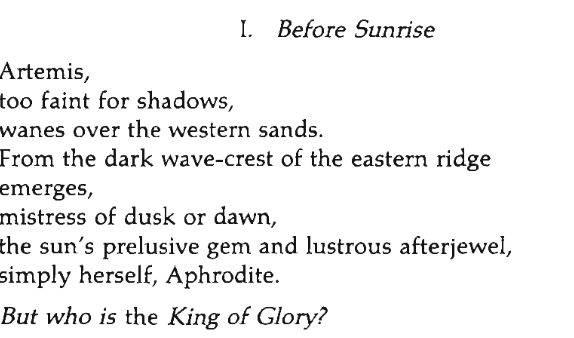Articles/Essays – Volume 11, No. 3
Epithalamion
(Marriage Song for DJ. and N.J.)
I. Before Sunrise
Artemis,
too faint for shadows,
wanes over the western sands.
From the dark wave-crest of the eastern ridge
emerges,
mistress of dusk or dawn,
the sun’s prelusive gem and lustrous after jewel,
simply herself, Aphrodite.
But who is the King of Glory?
II. Temple
Be ye lift up,
ye everlasting doors.[1]
At five thousand feet,
in the temple crowning Manti hill,
two temples determine to unite:
spirit and body,
separate till now,
become a soul
growing eternally
until
through corruption,
resurrection,
and incorruption,
by love and offspring
in this world and the next,
two souls,
becoming one,
“put on perfection.”[2]
And his name
shall be called
(“else a great prince in prison lies”)[3]
Wonderful.[4]
III. Wedding Breakfast
At Manti park,
corrugated roof,
cast-iron pillars,
timber benches, tables,
and portly waste-bin
bid welcome.
Up to our presence a stray dog prances,
the spirit of place, some Walter-Mitty godling,
fancying himself as a maitre d’hotel
and hoping for scraps. Observers of Venus,
the sparrows volatilise, winged waiters
not waiting to serve. As we sit munching,
a whirl of dust ushers a spatter of rain
from the huge flask of the thunder-bull
Nandi[5] the liberator,
lowering over the range.
Here we eat, drink,
and make merry; for today we live,
and tomorrow and tomorrow,[6]
triumphant,
quiet,
unaffectedly content:
a family and friends
attending eternity.
But now the sleepy whirr along the tarmac
northward home.
IV. Reception
Evening stasis: time for the clouds to recline
in pastoral pastel yet formal dignity
above the recumbent ranges’
assumption of condign formality
in deepest purple;
time for the steely lake
to look as though it promised nothing
but held the whole future;
time, too, for the vegetation
to put its patience into waiting;
and high time for the declared consorts,
like Henry Moore’s, to be seated
(a fuller and worthier custom
than standing in line)
and over a chatsworth[7] of cup and plate
to receive and accept the world.
For the divine covenant of marriage
must also embody a social contract;
predicated, certainly, upon the adoption of righteous
principles
(springing from the love of God),
but equally upon right living and its rites
(reflecting love of neighbour);
but (whether these appear to be there or not)
whom God hath joined together
(and that can be judged only in heaven)
no one here
(and here—
now as always—
stands for anywhere)—
no one here will set asunder.
Rather, in lambently circumambient benevolence,
we approve our two young lovers,
who look as if they dated from before beginning,
had arrived with the tides that set in from outside time,
and waxed solitary in the flesh
(yet part your lips,
lift your tongue tip,
and enunciate the slight but symbolic
supererogation of your shared
assonance, Nancy and Daniel)—
grown in the flesh
like the patriarchs to beget
(that you may have joy),
age together
(that your joy may be full),
and after coming forth in the first resurrection
through an eternal progression
perpetually to renew yourselves
priest and priestess
king and queen.
Yet these are even now prophetically shadowed
in this twilight our dark glass[8]
less obscure for the familiar spirits
hovering behind your shoulders
to meet as your eyes meet
reflecting each other
endlessly through opposite mirrors
lamplit face to face.[8]
V. Night
No moon, no planet for the here and now!
Should there be stars? A myriad eyes
must close to allow
the unseen, inward sun to rise
(the heart of sight’s a kind
of pointing, an indicative art;
the heart of darkness, an imperative touch to find)—
allow the sun to rise, to flood, cleanse, heal, irradiate,
and make two hearts one beat? One heart?
Neither, but more:
a not so definite but purer state
beyond the I and you,
the we,
the after and before,
beginning and surcease.
Behold (not see,
for He makes all things new[9]):
fountain of priestly power and delight,
too deep for darkness and too bright for light,
the Son of God, who comes again,
He is the King of Glory, He
the Prince of Peace.
Amen.
[1] Psalms 24:7-10.
[2] Donne, Epithalamion Made at Lincoln’s Inn, refrain.
[3] Donne, The Ecstasy, line 68.
[4] Isaiah 9:6.
[5] Indian bull-god, propitiated by women who want a child.
[6] Contrast Macbeth V. iv. 19.
[7] Chatsworth is the princely country seat of the Dukes of Devonshire.
[8] Cf. I Corinthians 13:12.
[9] Cf. Revelations 21:2-5.


 Back to full Issue
Back to full Issue

